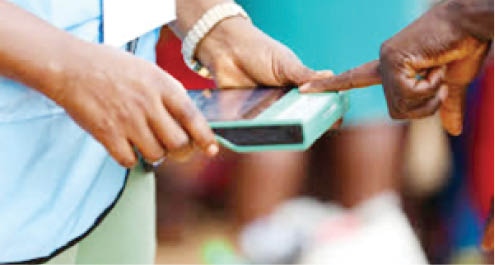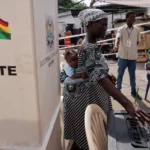During the 2023 general elections, voters are expected to go to polling units to elect the president, governors, as well as federal and state legislators.
The Independent National Electoral Commission (INEC) has said that elections for these offices are scheduled to hold in two phases, beginning with the presidency and National Assembly on Saturday, February 25, 2023, and then governorship and Houses of Assembly on Saturday, March 11, 2023.
Established by the 1999 Constitution of the Federal Republic of Nigeria, some of the functions of INEC are to organise, undertake and supervise all elections to the offices of the president and vice president, governors and deputy governors, members of the senate, House of Representatives and House of Assembly.
INEC is also responsible for monitoring political campaigns and providing rules and regulations which shall govern the political parties, conduct voter and civic education and promote knowledge of sound democratic election processes.
Flooding, Erosion: States Fail To Account For Multi-Billion Ecological Fund Accruals
Ex-ABU VC, Mahdi, buried in Gombe
Over time, the commission has expressed readiness to apply the provisions of the new electoral law in its resolve to conduct the 2023 general elections without fear or favour and ensure free, fair, credible, inclusive, and transparent elections come February thereby enriching Nigeria’s democratic culture and acceptable election outcomes.
The changes made in the newly signed Electoral Act has introduced some interesting changes, some of which are the conduct of early party primaries by political parties; technological changes in the electoral process; extension of time frame for campaigns by political parties; provision for central electronic voters’ database; revision of definition of over-voting; exclusion of political appointees from acting as voting delegates or aspirants; death of electoral candidates and technological adoption in electoral acts.
Under the new act, there is provision for the use of electronic devices such as smartcard readers, electronic voting machines and other technological devices in the accreditation process for voters and the general conduct of elections.
However, one of the new innovations in the Electoral Act is the deployment of the Bimodal Voter Accreditation System (BVAS).
The 2023 elections will rely on the deployment of technologies such as BVAS, INEC Voter Enrolment Device (IVED), INEC Result Viewing Portal (IRev) and other devices.
What is BVAS?
BVAS is an electronic device designed to read a Permanent Voter’s Card (PVC) and authenticate voters’ using fingerprints in order to prove that a voter is eligible to vote at a particular polling unit.
It is a technological innovation created to intensify the transparency of election results and boost public trust in election outcomes.
The usage of BVAS entails either scanning the barcode or QR code on the PVC/voter’s register, entering the last six digits of the Voter Identity Number (VIN) or typing in the last name of the voter by the Assistant Presiding Officer (APO) to verify and authenticate the voter.
INEC states that these technologies are solutions to some of the weaknesses in Nigeria’s electoral management, namely; falsification of votes at polling units, falsification of number of accredited voters, collation of false results, mutilation of results and computational errors, swapping of results sheets, forging of results sheets, snatching and destruction of results sheets, obtaining declaration and return involuntarily, making declaration and return while result collation is still in progress and poor recordkeeping.
The INEC Chairman, Professor Mahmood Yakubu, said, “When the commission introduced BVAS last year, the compact device was intended to achieve two objectives. First is the verification of the genuineness of the PVC and the fingerprint or facial authentication of voters during accreditation. Secondly, to replace the Z-pad for uploading the polling unit results to the INEC Result Viewing Portal (IReV) in real-time on election day.”
BVAS also acts as the INEC Voter Enrollment Device (IVED) during voter registration. Its usage has also eliminated the use of incident forms during accreditation on an election day.
Daily Trust on Sunday gathered from the situation room of the recently concluded Osun state gubernatorial election that INEC’s accreditation system, BVAS, performed better as there just reports of BVAS failing to authenticate voters by fingerprints and facials at most of the polling units while also there was no reported incident of low battery or malfunctioning of the BVAS in the polling units.
Nonetheless, there were cases of failed fingerprints and malfunctioning of the devices in a few locations.
However, the malfunctioned devices were fixed, and in some cases replaced by INEC following escalation by the Situation Room
The performance of the BVAS in terms of the turnaround time in the 2022 Osun state governorship election was by far better than in Ekiti and Anambra states and the FCT area council elections.
Observers stated that it took a maximum of two minutes to accredit a voter in the polling units.
Also, INEC’s distribution of the accreditation devices was reasonably proportional to the number of registered voters in the polling units.
This indicates that INEC has implemented some of the recommendations made by the Situation Room following the Ekiti State governorship election where it asked the commission to “double its effort to improve on the turnaround time of the BVAS” and distribute accreditation devices to polling units in accordance with the number of registered voters.
Also, the Situation Room observed that election officials displayed good knowledge of the voting process across board, leading to quick and seamless voting in many polling units
Furthermore, Daily Trust on Sunday learned that INEC will be deploying a total of 176, 846 BVAS machines for the February, 2023, general elections, with another 17,618 BVAS machines for backup.
Also, the data recovery centres of INEC would be upgraded and all its platforms enhanced before the elections in order to forestall the constant attacks the platform had received from hackers and political actors as the commission is determined to conduct free and fair elections in 2023.
INEC has succeeded in correcting and upgrading the use of BVAS which was evident in the just concluded Osun State gubernatorial election. BVAS will positively impact the 2023 general elections to achieve free and fair elections.
Inconclusive elections
A breakdown of the Electoral Act 2022 by Daily Trust on Sunday shows that Section 65 provides that the decision of the Returning Officer shall be final as it relates to unmarked ballot paper; rejected ballot paper; declaration of scores of candidates and the return of a candidate.
The act states that “INEC shall have the power of review of such a decision within seven days. The tribunal or court shall also have a declaration and the power of review of such decision.”
It, however, provides for a rerun in the event that a presidential candidate is not produced with a 25 per cent spread across the states, and the rerun is expected to be conducted within 21 days by INEC.
This explainer was produced in partnership with the Centre for Democracy and Development (CDD)

 Join Daily Trust WhatsApp Community For Quick Access To News and Happenings Around You.
Join Daily Trust WhatsApp Community For Quick Access To News and Happenings Around You.


